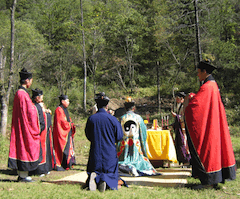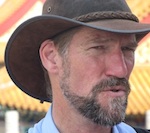Touching hearts and minds: faith environmental action
December 13, 2011:
 |
 |
 |
In 2000 Daoists banned use of 28 endangered species in traditional Chinese medicine |
Faith groups have a vital role to play in efforts to protect the environment, ARC Secretary-General Martin Palmer told a prestigious US gathering of conservationists and scientists.
Martin Palmer was among a group of conservation leaders and change makers brought together by WWF to discuss the future of conservation at the 2011 Fuller Science Symposium held at the National Geographic Society in Washington, DC, last month.
The theme was ‘How can new ideas and conservation science effect change?’
Martin’s speech was entitled: ‘Touching hearts and minds - the experience of the faiths in changing lives and the planet’. He started by reminding the audience of the scale of faith influence.
Faiths own about 8% of the habitable land surface of the planet outright, and contribute to about 50% to schooling worldwide (70% in some parts of sub-Saharan Africa). Around 85% of the world’s population describe themselves as belonging to a faith group, and religions are the 3rd largest investment group in the world. They also produce more newspapers and magazines than the entire European Union.
 |
 |
 |
ARC Secretary-General Martin Palmer |
“So the question isn’t ‘why would you work with the religions?’, the question is ‘why wouldn’t you?’,” he told them.
Martin Palmer paid tribute to the role of conservation groups in alerting faiths to the environmental crisis: “You were the prophets. You were the people who told the faiths there was a problem and you stirred their conscience.”
But while the conservation movement was “brilliant on externals and wonderful with data”, it was “appalling at the interior world”, he said.
 |
| “So the question isn’t: Why would you work with the religions? The question is: Why wouldn’t you?" - Martin Palmer |
|
 |
 |
“Don’t just work with the religions. Work with psychology and psychotherapy. Understand why people do what they do, don’t just bemoan the fact that they do it," he said. “Let’s journey inward, that’s what faiths do, in order that we can understand our relationship with the external world.”
Martin gave a number of examples of faith action on the environment, including ARC’s work with the Daoists in China on traditional Chinese medicine which led in 2000 to the Daoist ban on the use of 28 endangered species.
“The basis of traditional Chinese medicine is Daoism and the fundamental principle is the balancing of the natural forces of yin and yang,” he explained. “In 2000 the Daoists issued an official excommunication of anyone using the 28 endangered species.
“But more important they also said you cannot be healed if in seeking the materials to heal you, you disturb the balance of the universe. Now that’s probably going to have more of an impact long-term than any attempt to ban wildlife trade because it actually undermines the philosophy that justifies the violence in the first place.”
You can hear Martin’s presentation, as well as those of other speakers, to the Fuller Science Symposium by visiting WWF USA’s website here.
Other speakers included:
Lester Brown, Earth Policy Institute
– ‘On the edge of tomorrow: Global trends and what they mean for conservation’
Jon Foley, University of Minnesota – ‘How can we feed the world while sustaining the planet?’
Randy Olson, Prairie Starfish Productions
– ‘Dude, where’s my climate movement?’
Bill Clark, Harvard University
– ‘Conservation science for sustainable development: Beyond “fighting for the crumbs?’
Panel Discussion: National Geographic Society Chairman John Fahey, Lester Brown, Jon Foley, and Professor Rob Wilby of Loughborough University
–‘Conservation science in a changing world’
|

